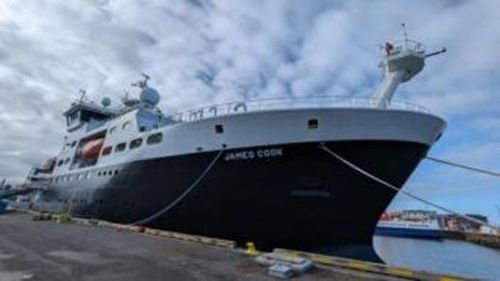National Oceanography Centre trials fossil-free marine fuels

The RRS James Cook. / SOURCE: U.K. National Oceanography Centre
October 4, 2024
BY U.K. National Oceanography Centre
The UK’s National Oceanography Centre (NOC) is trialing the use of a fossil-free marine diesel to fuel the Royal Research Ships (RRS) James Cook and Discovery.
Use of hydrotreated vegetable oil (HVO), made from used vegetable oils and fats and non-food crops, is able to significantly reduce net CO2 vessel emissions, compared to conventional diesel fuel.
The trial is funded by the UK’s Natural Environment Research Council (NERC), which owns the two vessels, in support of a UK Research and Innovation (UKRI) goal to achieve net zero emission operations by 2040.
Advertisement
HVO can be used as a “drop-in” replacement in marine engines and because it’s made from already used products and non-food crops, it’s life-cycle CO2 emissions are much lower than fossil fuel.
Kevin Williams, Head of Research Ships Engineering at NOC, says, “As a research organization, NOC is focused on understanding and protecting our ocean. Reducing our own environmental footprint is a key part of that and the carbon emissions from our vessels is a major part of that.”
Advertisement
During the trial, HVO is replacing the low sulfur marine gas oil (LSMGO) NOC normally uses. HVO is one of the more stable biofuels, which means it’s suitable for the different conditions NOC vessels operate in, from high temperature regions to the Arctic.
However, there are some challenges around its use, such as cost and availability, especially in the remote places NOC operates, says Williams.
The HVO trial is part of wider emissions reduction work at NOC. For the vessels, this includes assessing the use of batteries onboard, to reduce the use of the engines during scientific operations, and a focus on marine operations planning, to reduce transit time and more efficient routing based on weather.
Related Stories
To further strengthen their collaboration on reducing emissions in logistics, DHL Group and Neste have agreed to jointly evaluate how Neste’s renewable solutions, such as renewable diesel and SAF, can support DHL in its decarbonization targets.
Avfuel Corp. on Jan. 31 announced it is expanding the availability of sustainable aviation fuel (SAF) by offering the fuel at three additional supply terminals located in Linden, New Jersey; Pasadena, Texas; and Florida’s Port Everglades.
Moeve and Norwegian signed a contract to accelerate the decarbonization of air transport between Spain and the Nordic region by promoting SAF. Moeve produces SAF at its La Rábida Energy Park (Huelva) from used cooking oils.
The Singapore Airlines (SIA) Group has signed a memorandum of understanding (MoU) to potentially source neat sustainable aviation fuel (SAF) from Aether Fuels, which plans to commence production in five years.
DHL Express has signed a deal with Cosmo Oil Marketing Co. Ltd. for the purchase of sustainable aviation fuel (SAF) to drive emission-reduced air freight in Japan. The deal represents an annual purchase of 7.2 million liters of SAF.
Upcoming Events










